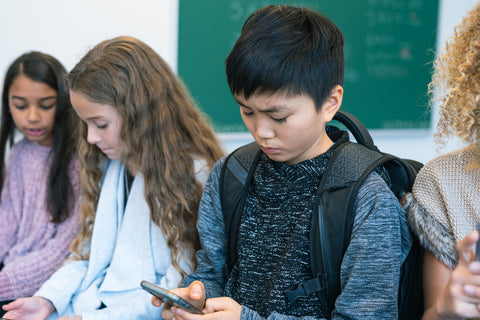A nasty comment on an Instagram post, a bit of gossip in the group chat, people attacking each other in the comments of a news article- you’ve probably seen behaviour like this while scrolling through social media.
As adults, we know how nasty people can be online, and the scary thing is our children aren’t immune to this kind of behaviour.
Cyberbullying is a huge problem, with 7 in 10 children experiencing it in some form before they turn 18.
Worryingly, cyberbullying can be hard to spot, which is made worse by the fact that only 38% of victims will tell their parents about it.
Cyberbullying can occur anywhere there’s internet access, on social media, messaging apps, even online games like Roblox and Fortnite. With 68% of children developing mental health issues after being cyberbullied it’s vital that we recognize the sings so we can step in before it gets worse.

Cyberbullying can include:
• Sending abusive or threatening messages
• Sharing embarrassing photos, screenshots or videos
• Spreading rumours and gossip
• Creating fake profiles to harass or upset another person
• Tricking the victim into believing they are someone else
So how do you know if your child might be the victim of cyberbullying, especially if they hide it or won’t talk about it? There are a few things to look out for.
Signs your child is being cyberbullied:
• Difficulty sleeping
• Become sad or distressed after being on their devices
• Getting headaches and stomach aches
• Withdrawing socially
• Loss of interest in hobbies
• Sudden, out of character changes in behaviour
• Spending more time with parents and less time with friends
• They’re getting more messages than usual
• Start acting secretive
• Nervous about going to school
• Doesn’t want to talk about what they do online
• Stops using their tech altogether
Noticing these behaviours in your child could mean they’re experiencing cyberbullying, and the good news is there’s always something you can do about it.
What can I do if my child is being cyberbullied?
Firstly, if there’s a real physical threat to your child or family’s safety, call emergency services.
Make them comfortable: Kids might be embarrassed about the cyberbullying they’ve experienced. Creating a safe, judgement free zone for them to talk and letting them know they’re not in trouble could help them feel more comfortable opening up about their experience.
Collect evidence: Collect and save any screenshots of conversations, videos, pictures, emails and text messages. The bully might delete evidence when they realize it could get them into trouble.
Report and block: Make sure your child knows how to report and block users on the online platforms they use. If you want to report the bullying to your child’s school, check to see their policy on bullying and the options you have, but avoid contacting the bully’s parents directly.
Consider counselling: If needed, your child could benefit from talking to a professional counsellor to help them develop healthy coping mechanisms, boost confidence and resilience. Some schools offer a free counselling service for students, so be sure to see what your child’s school offers.
Offline activities: Encouraging your child to get involved in hobbies like drawing, bike riding, puzzles or learning an instrument gives kids space to be creative, develop their focus and take their mind off their problems for a little while.
Cyberbullying is an awful experience for children and their families, and recognizing the signs and letting your child know you’re there to support them will go a long way in helping them overcome the situation.
Helpful resources:
